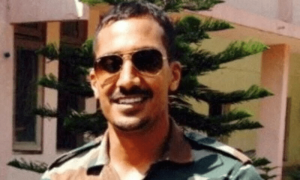STOCKHOLM: The third annual Stockholm Internet Forum, a gathering of 450 digital activists, technologists and media persons from 90 countries, saw day one of the conference on Tuesday focused on the “darkness of digitisation” — a defining term coined by Director of Global Affairs at Human Rights Watch Eileen Donahoe during the opening session.
Almost every panel at the event focused on questions of online surveillance, governance and protection of privacy in a world fundamentally changed by the revelations of NSA whistleblower Edward Snowden, who was ironically not invited to attend or speak via webcam at the conference.
Representing Pakistan at the global forum, Bolo Bhi Director Sana Saleem spoke frankly during a session on online privacy and data collection, calling for a civil society led “pushback against the normalisation of surveillance in the name of national security” — or in simple terms, citizens allowing states access to their private information under the assumption that such practices ensure greater safety for the majority, and such surveillance is ‘inevitable’.
Terming this trend a dangerous “redefining of privacy”, Saleem argued that, “equating security with privacy will result in the death of privacy”. Professor, Research ICT Africa, Alison Gillwald expanded on this line of argument, citing examples of how “the assumption that enormous amounts of private information are necessary to create greater security does not translate into reality.”
Gillwald also added a second major concern related to the global impact of work being undertaken related to online privacy: policy laundering, wherein governments from developing countries “borrow” internet policy regarding security and privacy from developed nations, and then apply those laws to their own states where there are no real checks and balances or rule of law in place to ensure such policies work in the public interest.
Talking on an a issue that mirrors the state of online privacy in Pakistan, Managing Partner, Africa TMT, Ihab Osman pointed out: “Governments in places like Sudan collect users’ private data themselves, without even asking the ISPs, or ISPs have to provide the data by law…it is common in most developing countries. As such, we should currently be less worried about the data being collected and more focused on how that data will be used.”
Experts on the panel also provided examples of how online privacy could go down a slippery slope towards censorship.
“If I am an ordinary citizen and I decide to run for parliament, but in a Google search you find I supported far right ideas 15 years earlier, is this something to be hidden from public?” asked OSCE Representative on Freedom of the Media, Organisation for Security and Cooperation in Europe Dunja Mijatovic. “I don’t think so...if you have data companies and privacy agencies taking down information that is problematic too.”
In terms of solutions to the current issues surrounding online privacy, a central problem identified was that the redefinition of online privacy was being led by big businesses and governments rather than by citizens.
Saleem argued that citizen-led pushback was a vital need as “even companies like Google have started to at least attempt to appear to care about the issue of privacy as a result”.
While all the panellists agreed that the issue of online privacy was not top of mind for the average internet user, Fellow, Observer Research Foundation, Mahima Kaul pointed out that “attitudes towards online privacy should not be confused with the need for rights to online privacy”. Kaul said it was critical for people to be better informed and educated about internet for the issue of privacy rights to be addressed.
Further discussion focused on the need for a privacy framework to protect human rights that keep up with the pace of online technological advancements and growing internet access.
The writer is Editor of Dawn.com
Published in Dawn, May 28th, 2014

![[From left] Sana Saleem, Dunja Mijatovic, Stephen Sackur, Alison Gillwald, Mahima Kaul - Photo by Jehan Ara [From left] Sana Saleem, Dunja Mijatovic, Stephen Sackur, Alison Gillwald, Mahima Kaul - Photo by Jehan Ara](https://i.dawn.com/primary/2014/05/53857f8e38979.jpg)











































